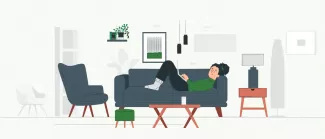Furniture & Equipment
As before mobility, it is also important during mobility to inform yourself about swap markets and second-hand shops. When you arrive, you often notice that your flat is not fully equipped or that you have forgotten something. In order to be CO2 neutral, you can often buy the missing items in cheaper second-hand shops without having to cut back on quality.
You can also find out about swap markets at your host university during your stay. If there are none, this is a good time to take the initiative and set up such platforms. Often, simple social media groups are enough to start a swap market.
If you do need to buy new items for your accommodation, it is important to pay attention to the sustainability of these products. Materials, durability and recyclability are crucial parameters to consider when buying new furniture.
Just as it is important to purchase items, it is also important to consider sustainability when disposing of them. Each country has different methods for disposing of waste, and larger items such as furniture are usually scrapped separately. Information on how to dispose of things in the most sustainable way can usually be found on the website of the city or waste management company.
Due to the relatively short duration of the Erasmus, compared to the longevity of the furniture, it makes sense not to resort to new items. In addition, passing on and exchanging furniture between students creates a social aspect that goes beyond simply buying.
Actions you can take
- Find out about swap markets or platforms at your university. If there are none, take the initiative and build one.
- When disposing of furniture, try to find out what the most sustainable ways are and what option your host country/host city offers.
- If you want to decorate your accommodation, buy plants for your room, balcony or garden. Plants bind C02 and provide better air quality.
- Repair instead of buying new. Furniture and electrical appliances are often not unusable when they no longer work, but only need to be repaired. It is much more sustainable to repair than to buy new.
- Upcycle. If you have broken items, get creative and think about what function they could still serve and create something new.
